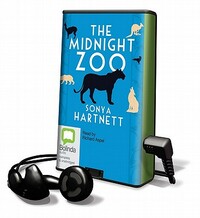You need to sign in or sign up before continuing.
Take a photo of a barcode or cover
Stunningly written, and full of hope. But a YA book I suspect appeals more to adults than young adults.
The Midnight Zoo is hard to pin down for readership: middle grade is pushing it since there are a few disturbing war scenes that are likely to disturb younger readers. YA doesn't quite do it justice, since adults would enjoy the fairy-tale like story of two Romanian gypsy brothers and a baby sister on the run during the German invasion of their homeland.
I can think of few books that DRIP of poetic beauty on each and every page; The Midnight Zoo joins these esteemed ranks. Reminiscent of The Book Thief (where death is a narrator), Sonya Hartnett cleverly tucks Night as a narrator as the story unfolds. for the most part, in one night's span. This is the story of family, duty, honor, grace, and love.
The final chapter at first frustrated me---how could she end the book so easily wrapped up, I wondered? But keep reading, for the ending will surely haunt you long after the book is finished like it has me. I can't wait to tuck this one in my son's hands. It is likely that he will be confused by the ending, and that is where the conversation will likely begin. HIGHLY RECOMMENDED
"People jeer at those who are different from themselves-those who look different, or think differently, or live in different ways. They do it because difference is a frightening thing-sometimes an enviable thing."
"How peculiar! You can go anywhere your feet take you, and yet you're not free. There are no bars around you, yet you're in a funny kind of cage. That isn't fair." "Cages come and get you."
'...underneath his grief and disenchantment, his belief in a good world was still there. And the more difficult it became to find the goodness, the more certain he was in his faith that it was there.'
"Every war is everyone's war, lioness...Every life is everyone's battle..."
I can think of few books that DRIP of poetic beauty on each and every page; The Midnight Zoo joins these esteemed ranks. Reminiscent of The Book Thief (where death is a narrator), Sonya Hartnett cleverly tucks Night as a narrator as the story unfolds. for the most part, in one night's span. This is the story of family, duty, honor, grace, and love.
The final chapter at first frustrated me---how could she end the book so easily wrapped up, I wondered? But keep reading, for the ending will surely haunt you long after the book is finished like it has me. I can't wait to tuck this one in my son's hands. It is likely that he will be confused by the ending, and that is where the conversation will likely begin. HIGHLY RECOMMENDED
"People jeer at those who are different from themselves-those who look different, or think differently, or live in different ways. They do it because difference is a frightening thing-sometimes an enviable thing."
"How peculiar! You can go anywhere your feet take you, and yet you're not free. There are no bars around you, yet you're in a funny kind of cage. That isn't fair." "Cages come and get you."
'...underneath his grief and disenchantment, his belief in a good world was still there. And the more difficult it became to find the goodness, the more certain he was in his faith that it was there.'
"Every war is everyone's war, lioness...Every life is everyone's battle..."
I only gave The Midnight Zoo a 3 (I wish I could have given it a 3.5) out of 5 because at first the book seemed to be missing something. I read this on an ereader and went back a couple of times to see if I had skipped some pages accidentally. Of course, I hadn't and after finishing the book I realized what exactly happened. I found it to be a sad story, and although this could not have happened, what it symbolized could have. I think it symbolizes what wars do to people and the lives they live. Ultimately lives are lost and much destruction is caused. The Midnight Zoo was originally published in Australia. This story is about two boys whose entire gypsy community is destroyed during the war. They wander along until they come to a zoo one night where the animals are still caged and dying. To their surprise the animals begin talking to the boys. In retrospect I wonder if one of the boys was dreaming this. This book was shortlisted for the CILIP Carnegie Medal in 2012. I think this would be a book worthy of reading a second time to catch the symbolism of things you missed the first time.
What a wonderful book! I especially loved that the animals got to tell their stories with their own voice. Recommended for those 9-12yrs, but I think it transcends age.
challenging
emotional
inspiring
mysterious
reflective
tense
medium-paced
Plot or Character Driven:
Character
Strong character development:
Complicated
Loveable characters:
Yes
Diverse cast of characters:
Complicated
Flaws of characters a main focus:
No
For mature students. My school library has this tagged “Year 6 only”.
Could work well as a class novel, around freedom, WW2, conflict, kindness, hope. Lots of lit features: extensive personification of Night, metaphor, vivid verbs etc without being especially complex to follow. Nice parallels between the lioness and the boy’s mother; and the other animals also each have different base personalities.
Non-linear, with stories from the animals of the zoo, and flashbacks as to how the boys came to be here.
Beware thematically:ending heavily implies death of all characters; no doubt from the earlier bombing It’s written hopefully, and it’s implied, not explicit, but still.
Fable is a good word.
Some nice integration of foreign languages (Czech location; German soldiers). The boys are Roma, which also leaves space for rich discussions, including intercultural understanding.
Could work well as a class novel, around freedom, WW2, conflict, kindness, hope. Lots of lit features: extensive personification of Night, metaphor, vivid verbs etc without being especially complex to follow. Nice parallels between the lioness and the boy’s mother; and the other animals also each have different base personalities.
Non-linear, with stories from the animals of the zoo, and flashbacks as to how the boys came to be here.
Beware thematically:
Fable is a good word.
Some nice integration of foreign languages (Czech location; German soldiers). The boys are Roma, which also leaves space for rich discussions, including intercultural understanding.
Moderate: Child death, Death, Racial slurs, Racism, Blood, War
Minor: Animal cruelty, Animal death, Genocide, Gun violence, Religious bigotry
adventurous
reflective
sad
slow-paced
Plot or Character Driven:
Plot
Strong character development:
No
Loveable characters:
No
Diverse cast of characters:
Yes
Flaws of characters a main focus:
No
the slur against Roma was unnecessary and the white author had no business using it.
the book is beautifully written but i am hesitant to how accurate the representation is, seeing how reckless the author has been with the language they used.
the book is beautifully written but i am hesitant to how accurate the representation is, seeing how reckless the author has been with the language they used.
Graphic: Racial slurs
I love the way this author writes - her use of language, her magical realism, her rich description, her truthes. I especially appreciate her craft because I am not usually a fan of the fable, but I loved reading this book and enjoyed it right to the last, haunting chapter.
I've written a proper review for the Centre of Youth Lit enewsletter and will add it here once it comes out in print.
This book would make a great replacement novel in the school curriculum for Haroun's Sea of Stories (which I did not get at all) and would sit well with Yann Martel's Life of Pi and Orwell's Animal Farm in the English curriculum.
But go on, read it just for the sheer enjoyment of the language and the story.
----- -----
UPDATE: Here's the review for the Centre for Youth Literature's Read Alert blog. It's online now, also copy/pasted below:
Two orphaned gypsy boys, escaping the chaos of WWII in Eastern Europe, find refuge one night in an abandoned zoo. But they are not alone. Under the illumination of Night’s ‘lunar lantern’, the boys and beasts exchange stories of loss, courage and insight, as they struggle to understand what is going on around them. In this modern fable, Hartnett explores freedom in its many forms. The author’s ability to believably portray a child’s buoyant spirit and unshakable faith in the laws of nature and goodness - even in the midst of war - and the book’s haunting final chapter leave the reader feeling inspired and rewarded
I've written a proper review for the Centre of Youth Lit enewsletter and will add it here once it comes out in print.
This book would make a great replacement novel in the school curriculum for Haroun's Sea of Stories (which I did not get at all) and would sit well with Yann Martel's Life of Pi and Orwell's Animal Farm in the English curriculum.
But go on, read it just for the sheer enjoyment of the language and the story.
----- -----
UPDATE: Here's the review for the Centre for Youth Literature's Read Alert blog. It's online now, also copy/pasted below:
Two orphaned gypsy boys, escaping the chaos of WWII in Eastern Europe, find refuge one night in an abandoned zoo. But they are not alone. Under the illumination of Night’s ‘lunar lantern’, the boys and beasts exchange stories of loss, courage and insight, as they struggle to understand what is going on around them. In this modern fable, Hartnett explores freedom in its many forms. The author’s ability to believably portray a child’s buoyant spirit and unshakable faith in the laws of nature and goodness - even in the midst of war - and the book’s haunting final chapter leave the reader feeling inspired and rewarded
És bastant interessant i té punts molt interessants on et convida a reflexionar i a empatitzar però el final és.... a choice.






